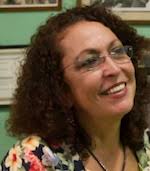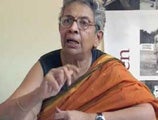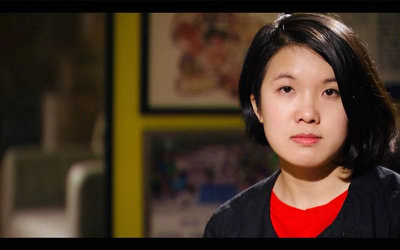
Rabab Abdulhadi
1955-
Rabab Abdulhadi, born in 1955 in Palestine, is an activist and scholar contributing to the struggle for Palestinian self-determination and the well-being of Palestinian women. She was the Director of Political and International Relations at the Middle East Research Center in New York. She helped found the Union of Palestinian Women's Associations in North America during the first Intifada, or Palestinian uprising. At last contact, she was conducting research for the Gender and Sexuality Studies Center, in the Global South Project.
Keywords: reproductive rights, rural women and land reform
Media: Transcript (English), Video, Bibliography, YouTube Video, Name Pronunciation Audio

Mónica Baltodano
Mónica Baltodano, born in 1954, began her activism with the Sandinistas as a student and continued her efforts through underground mobilization, surviving imprisonment and torture. She was awarded the title of Commander Guerrilla for her service, and has held a number of political offices including Vice Minister of the Presidency and Minister of Regional Affairs. Upon leaving the FSLN in 2005, Ms. Baltodano helped to found the Movement to Reclaim Sandinismo (known as El Rescate).
Keywords: education, gender-based violence, imprisonment, politics and the law
Media: Transcripts (English, Spanish), Video (English, Spanish), Bibliography, English YouTube Video, Name Pronunciation Audio

Barbara Labuda
Barbara Labuda was born in 1949 and studied Romance languages in Poznan, Poland as well as Ecole Normale Superieure in Paris, France. Labuda became active in anti-communist organizations in the 1970s for which she was imprisoned in 1982. In 1996, she began serving in President Aleksander Kwasniewski's Cabinet. She admits that the anticommunist organizations with which she worked did not support women's rights.
Keywords: imprisonment, politics and the law, reproductive rights
Media: Transcript (English, Polish), Video (English, Polish), Bibliography, English YouTube Video, Name Pronunciation Audio

Vina Mazumdar
1927-2013
Vina Mazumdar (1927-2013) was a professor and past fellow of the Indian Institute of Advanced Studies, serving on the Committee on the Status of Women in India and later directing the Programme of Women's Studies at the Indian Council of Social Science Research. She founded the Centre for Women's Development Studies and became its Chairperson. The GFP staff note with sadness the death of Vina in 2013. To learn more about her contribution to women's movement in India, read her public obituary written in The Hindu Paper.
Keywords: feminist conferences, academia and women's studies, rural women and land reform, politics and the law
Media: Transcript (English), YouTube Video, Video, Bibliography, Name Pronunciation Audio

Vilma Núñez
Vilma Núñez, born in 1938, served as the first woman on Nicaragua's Supreme Court after the Sandinista Revolution. As a student, she became a member of the FSLN and participated in the anti-Somoza struggle, until she was imprisoned for these efforts in 1979. Núñez has been unofficially banished from the FSLN after running for president against Daniel Ortega and defending charges of sexual abuse against him. Núñez founded the Nicaraguan Center for Human Rights (CENIDH) in 1990.
Keywords: gender-based violence, human trafficking/prostitution, imprisonment, international rights, politics and the law
Media: Transcript (English, Spanish), Video , Bibliography, Name Pronunciation Audio

Andrea Lee Smith
Andrea Lee Smith, born in 1966, is an activist/educator. She served as a delegate to the United Nations World Conference Against Racism in Durbin (1991), representing the Indigenous Women's Network and the American Indian Law Alliance. She is one of the founding members of Incite! Women of Color Against Violence, and is the co-founder of the Chicago chapter of Women of All Red Nations (WARN). She has organized several conferences, including the Color of Violence I & II Conferences, Race, Gender and the War Community Forum, and Decolonizing Methodology and Beyond: Constructive Proposals for Indigenous Methodologies.
In the period since this interview, significant doubt has been cast on Dr. Smith's assertion of a Native American or Woman of Color identity. We have retained her interview in this collection of oral histories because her interview was part of the original archive, and because we believe that scholars can and should study what she said in the interview in the context of subsequent conversations (see the articles below, including an open letter from Indigenous women, for more context).
Articles
Barker, J. and others (2015/2018). Open Letter From Indigenous Women Scholars Regarding Discussions of Andrea Smith. Indian Country Today. (originally published July 7, 2015; updated Sept. 12, 2018). https://indiancountrytoday.com/archive/open-letter-from-indigenous-women-scholars-regarding-discussions-of-andrea-smith
Viren, S. (2021, May 26). The native scholar who wasn’t. New York Times Magazine. https://www.nytimes.com/2021/05/25/magazine/cherokee-native-american-andrea-smith.html?campaign_id=190&emc=edit_ufn_20210526&instance_id=31650&nl=updates-from-the-newsroom®i_id=77849961&segment_id=59119&te=1&user_id=a41227382243ef7aa71174705b181411
Keywords: intersectionality
Media: Transcript (English), Video, Bibliography, YouTube Video, Name Pronunciation Audio

Maria Amélia de Almeida Teles
Maria Amélia de Almeida Teles, born in 1944, is a founding member of the União de Mulheres de São Paulo (São Paulo Women’s Union), a feminist NGO that focuses on the fight against domestic violence and on women’s empowerment and legal rights. A former member of the Communist Party of Brazil and, in the 1970s, a victim of torture by the military government that ruled Brazil from 1964-1985, Teles frequently lectures on feminism and human rights and has published widely on the history of feminism and women’s human rights in Brazil.
Keywords: gender-based violence, imprisonment, politics and the law, LGBTQ rights, racial identity
Media: Transcript (English, Portuguese), Video, YouTube Video (Portuguese, English Subtitles), Name Pronunciation Audio




